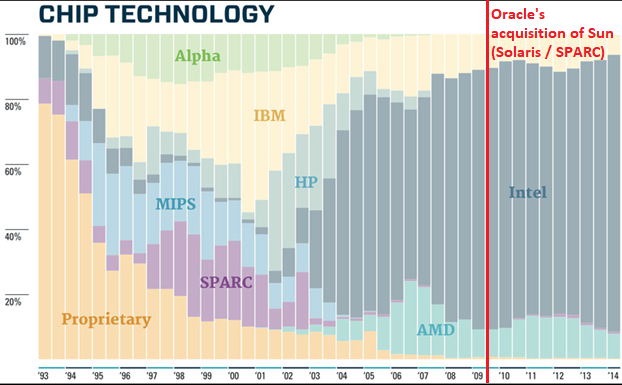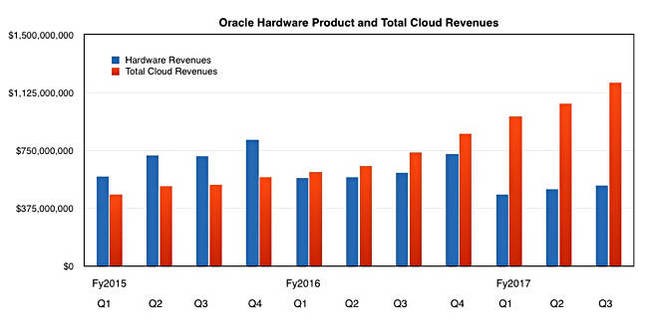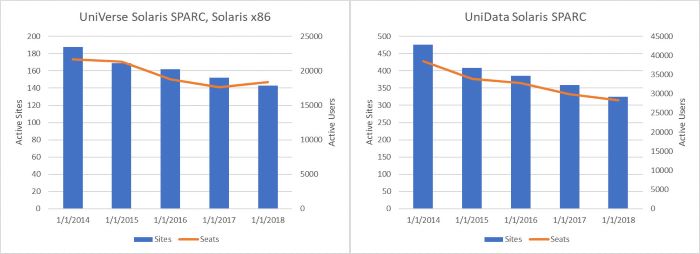Is the Sun Setting on Solaris and SPARC
February 14, 2018
Over the last several months we have seen indications that the Solaris SPARC and Solaris Intel (x86) Operating Systems (OS) platforms are likely to be retired soon by Oracle. Although an official announcement has not been made by Oracle, the press is already abuzz with plenty of evidence that the platform is retiring into a minimal maintenance mode. James Gosling, Java’s creator, went as far as to say “Solaris … got a bullet in the head from Oracle” following the announcement of further layoffs this last September.
So, what exactly happened?
To understand how we got here, let’s turn back the clock nearly a decade. Oracle purchased its main competitor, Sun Microsystems (the makers of Java, the Unix-based Solaris OS, the open-source MySQL database, and SPARC hardware), in April 2009 for $7.4bn. Many understood the motive to be focused on acquiring Java (the #1 programming language in the world), and to compete with IBM by having a “one-stop-shop” for complete business technology solutions with the SPARC hardware and Solaris software. Previously only a software company, this acquisition became Oracle’s first foray into the cutthroat hardware business, particularly focusing on “big iron” Solaris/SPARC solution sales to enterprise customers.
Long before Oracle’s acquisition, the Sun SPARC chipset that powered its hardware sales faced dwindling adoption rates starting in the early 2000s. As you can see in the Chip Technology Market Share infographic below, the more popular x86 chipsets (largely led by Intel and AMD) have dominated the market starting with the “PC era” when Intel’s Pentium chipset was released in 1993, leading up to the enterprise Xeon processors, in their 30th generation today.

This purchase did not make sense to some analysts who cited the consistent declining hardware revenue for SPARC. This trend was established prior to Oracle’s acquisition and continued afterwards as the enterprise hardware market has competed more heavily against cheaper Cloud-hosted offerings (such as Amazon Web Services, Microsoft Azure, and Google Cloud Platform). Even Oracle’s own most recent Cloud Hosting revenues (red bars) reveal this larger market trend in the chart below.

Analysts also critique the competition between Oracle’s Solaris OS and its own Linux variety, which is used internally in their business applications. As a side note, Rocket has been working on testing and certifying Oracle Enterprise Linux (x86) and we’re happy to report that UniData 8.2.1 and UniVerse 11.3.1 have both been certified on this platform, post-GA.
With dwindling market share and a $2bn annual run rate, the Oracle SPARC hardware business has been heading towards trouble for some time. One possible reason for the uphill battle may be that as enterprise customers face the inevitable hardware upgrade decision, they are also considering the OS that runs on that hardware and its ability to adapt to future trends. For instance, customers are realizing as they explore potential moves to the cloud that popular cloud-hosting providers such as Amazon Web Services and Microsoft Azure do not offer SPARC or HP-UX Itanium Virtual Machines (VMs). To combat this trend, Oracle itself is offering hosted SPARC VMs in the cloud.
As a consequence of the continued declines in market demand, in January 2017, Oracle laid off 1,000 employees in the SPARC hardware and Solaris OS divisions. In September 2017, an additional 2,500 employees were laid off in what effectively shuts down new development of the SPARC and Solaris products. It is estimated that less than 10% of the SPARC and Solaris staff remain and some have noticed that even Solaris 12 has disappeared from the Oracle roadmap. However, as of January 2018, they have confirmed that at least Solaris 11.4 will be released in the first half of 2018.
Has this market change affected the MV Roadmap?
Each major release of our MultiValue dataservers includes a thorough review of the platforms we plan to continue to support for the life of that version. We also see this as an opportune time to explore adding support for new OS platforms that are gaining popularity in the market, such as Amazon Linux AMI and Oracle Enterprise Linux. We typically make this type of decision at a major release, as it would be too disruptive to change platform support at an update release. Therefore, the decisions we make at a new version or major release for certifying an OS usually affect our platform support for several years (at least five years for dataservers and three years for tools). Certifying means that we have either tested and certified a Rocket MV product on a particular OS platform or that the manufacturer has released a statement of binary compatibility with a platform that we have certified.
As it relates to future major releases, the various news stories indicating that the sun may finally be setting on Solaris and SPARC are coincidentally occurring at a time when Rocket MultiValue is reviewing our OS Platform support strategy due to forthcoming new versions of the UniVerse (12.1) and UniData (9.1) dataservers. Historically, the vast majority of MV dataserver platforms have been comprised of AIX, Windows, and Linux operating systems. In looking at our much smaller Solaris platform base for UniVerse & UniData, our adoption metrics over the last five years show a steady downward trend where customers are consistently moving away from these platforms (beginning long before the latest Solaris headlines were announced, and without any changes to our Rocket roadmap and planned certifications).
For the initial GA release of UniVerse 12.1.1, we will limit our launch to our Tier 1 UniVerse platforms: Windows, Linux flavors*, and AIX (*includes Oracle Enterprise Linux (x86), SuSE Linux, and CentOS). We will not initially be certifying Solaris SPARC, Solaris Intel (x86), nor HP-UX Itanium. We are taking a “wait and see” approach for these next-gen versions of UniVerse and UniData on the Solaris and HP-UX platforms as we talk to more customers to understand their upgrade and migration plans.
Since upgrading to a major release of the dataserver usually includes an update to the OS platform, we see this as an opportune time to encourage customers to migrate to an OS that has a more solid and predictable future.
For UniVerse and UniData releases, Rocket will continue to support the Solaris and HP platforms with existing GA releases. In fact, we currently plan to add a Solaris-only release of UniVerse 11.3.2 and UniData 8.2.2 with native Python integration, one of our most exciting features introduced at 11.3.1 and 8.2.1 for Windows and Linux customers. This is with the hope of easing our customers through this transition period to another OS over the next several years.
What you can do if you’re running on Solaris/SPARC
Rocket will never let our customers fail. We are here to present options to help you plan for a future with far fewer challenges to supporting your invaluable business systems. We believe that based on the market data presented here, that Solaris SPARC and Solaris x86 have a limited life ahead. If you are running your MV application on one of these platforms, and you wish to continue to have the same “single phone call” service for both your OS and hardware through Oracle, we encourage you to begin thinking about switching to Oracle Enterprise Linux (x86), which is already certified for UniVerse 11.3.1 and UniData 8.2.1. This would allow you to participate easily in the upcoming beta of UniVerse 12.1 and UniData 9.1.
We are also exploring the possibility of adding support for Oracle Linux on SPARC hardware. This way, you can still get the “one-stop-shop” service you have come to expect from Oracle SPARC/Solaris, but now with SPARC/Oracle Enterprise Linux. This is currently not a planned release, so if you are interested in Rocket certifying Oracle Linux on SPARC, please reach out to our Senior Product Manager of MV Dataservers, Clay Allison ([email protected]) to request this new platform certification.
Upgrading your MV dataserver and switching OSs can seem overwhelming and it takes time, which is why we are proactively starting the conversation long before we release UniVerse 12.1 and UniData 9.1. We want to help you succeed and upgrade to the latest and greatest software features, performance, and security. If you are interested in migrating off Solaris and onto another platform such as Windows or Linux, we can help. Our Customer Solutions Department is available to help make this a smooth transition. Please contact [email protected] for details about upgrade assistance.
What do you think?
Henry Unger is President of Pulsiam, a public safety solutions provider. Pulsiam is both a long-time Rocket® MV and Oracle® partner, and has many UniVerse installations running on Solaris SPARC and Intel platforms, empowering 9-1-1 communication centers and first responders. In a recent conversation I had through email, Henry tells me that:
“Our development, administration, and support costs for Solaris are about one half of what they are for Linux. As much trouble as we have with hardware and operating system vendors pointing fingers at each other here in the United States, as we have encountered with Linux, trying to support multi-vendor solutions in other countries is a nightmare for us… Migrating existing Solaris SPARC customers to Oracle Linux on SPARC is not viable for us as we would not be able to take the customers down to effect that and, given the price/performance of Intel vs. SPARC at this point, our existing customers on SPARC are already looking at replacing their servers with Oracle Intel-based servers. Oracle Linux on Oracle x86 hardware is an interesting possibility. We would need to analyze what would be required for us to support that.”
What do you think? We hope to start a conversation about what comes next and how best to position ourselves to keep our MV business apps running well into the future, on modern and well-supported chipsets and OS platforms. We hope to hear your comments below.



